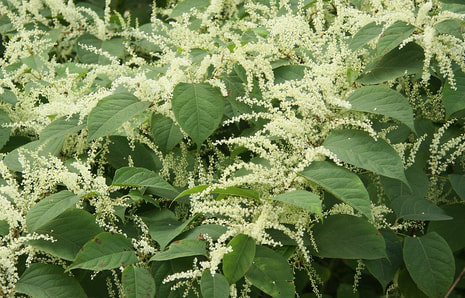The Mason Conservation District, in collaboration with the Mason County Noxious Weed Control Board and Hood Canal Coordinating Council, has received funding from the Washington State Recreation and Conservation Office for assessment, inventory, and subsequent treatment for invasive vegetation plaguing riparian areas of Hood Canal watersheds.
The Southern Hood Canal Riparian Enhancement Program (SHCREP) will be surveying the Skokomish watershed and near-shore areas and other sub-basins this summer, with assistance from the Washington Department of Ecology’s Washington Conservation Corps. This project will have phases of both assessment and inventory, as well as a treatment phase.
A number of noxious weeds have been identified which are degrading to local habitat. Among them are Scotch broom, reed canary grass, giant hogweed, Himalayan blackberry, and a particular focus of this project, the invasive knotweed species. You may have seen knotweed growing as single plants, as clumps along streams or rivers and on gravel bars, or in very large colonies up to 10 feet high with thousands of stems resembling bamboo. The broad-leaved knotweed can send out a root system hundreds of feet from the original plant. It displaces native habitat by invasion and its root and stem system can modify sedimentation processes and choke streams.
Once allowed to proliferate, it can migrate quickly depending on the watercourses. Treatment is usually done from the uppermost portion of the watershed where observed and then working downstream in order to limit re-infestation. Control and treatment of knotweed follows Best Management Practices (BMPs). Care should be taken if mechanical removal is undertaken as small pieces of stems or roots can develop into another thriving knotweed colony. Knotweed may also disperse by seed after flowering in late summer.
The Mason Conservation District will be seeking permission from landowners for the first phase of assessment and inventory, and if appropriate, for treatment. This very real threat to Hood Canal waters can be checked and controlled by active participation. Be forewarned that treatment of knotweed will require multiple years to eradicate.
Property owners are encouraged to actively participate by reporting known sites. Additional information may be obtained by contacting Marissa Newby at Mason Conservation District, (360) 427-9436.
Mason CD has two scotch broom pullers available for rent for residents of Mason County. There is no cost associated with renting these scotch broom pullers. To reserve the weed wrench please contact Jen at (360) 427-9436 ext. 113
The Southern Hood Canal Riparian Enhancement Program (SHCREP) will be surveying the Skokomish watershed and near-shore areas and other sub-basins this summer, with assistance from the Washington Department of Ecology’s Washington Conservation Corps. This project will have phases of both assessment and inventory, as well as a treatment phase.
A number of noxious weeds have been identified which are degrading to local habitat. Among them are Scotch broom, reed canary grass, giant hogweed, Himalayan blackberry, and a particular focus of this project, the invasive knotweed species. You may have seen knotweed growing as single plants, as clumps along streams or rivers and on gravel bars, or in very large colonies up to 10 feet high with thousands of stems resembling bamboo. The broad-leaved knotweed can send out a root system hundreds of feet from the original plant. It displaces native habitat by invasion and its root and stem system can modify sedimentation processes and choke streams.
Once allowed to proliferate, it can migrate quickly depending on the watercourses. Treatment is usually done from the uppermost portion of the watershed where observed and then working downstream in order to limit re-infestation. Control and treatment of knotweed follows Best Management Practices (BMPs). Care should be taken if mechanical removal is undertaken as small pieces of stems or roots can develop into another thriving knotweed colony. Knotweed may also disperse by seed after flowering in late summer.
The Mason Conservation District will be seeking permission from landowners for the first phase of assessment and inventory, and if appropriate, for treatment. This very real threat to Hood Canal waters can be checked and controlled by active participation. Be forewarned that treatment of knotweed will require multiple years to eradicate.
Property owners are encouraged to actively participate by reporting known sites. Additional information may be obtained by contacting Marissa Newby at Mason Conservation District, (360) 427-9436.
Mason CD has two scotch broom pullers available for rent for residents of Mason County. There is no cost associated with renting these scotch broom pullers. To reserve the weed wrench please contact Jen at (360) 427-9436 ext. 113
|
The Mason Conservation District is implementing a knotweed assessment in the Cranberry and Deer Creek Watersheds. Please assist us in completing this assessment by completing this survey.
|
|
Mason Conservation District
450 W Business Park RD Shelton, WA 98584 Phone: (360) 427-9436 Fax: (360) 427-4396 |
|

